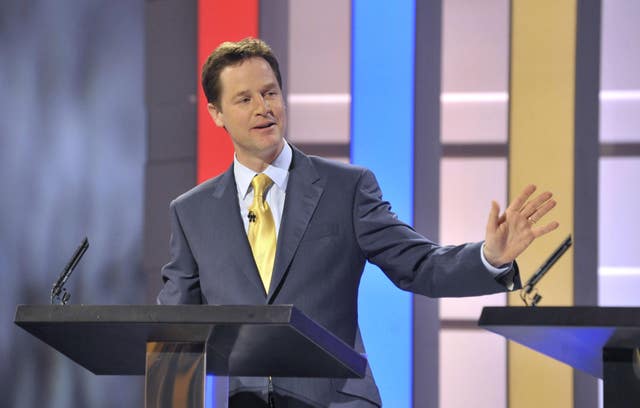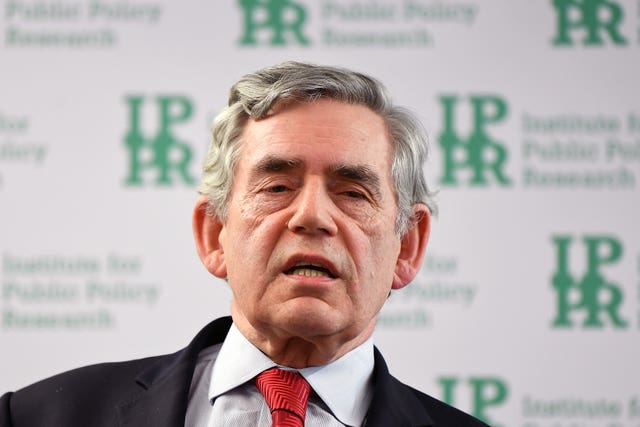
If television debates won elections, then Hillary Clinton would be in the White House and Nick Clegg could be fighting for a fourth term as prime minister.
But neither of those candidates benefited electorally from strong TV performances in 2016 and 2010 sparring with their respective political rivals.
Here is a look at why the broadcast debates are often not the be all and end all – but can still have some sway.
– Why do TV debates have limited impact?
The principal reason is that, according to research from Harvard Business School, 72% of voters make up their minds more than two months before the election – meaning few people will change their minds by the time candidates are behind the debate podiums.
The fresh study, which looked at 61 elections across nine countries, including the UK, concluded: “We find that debates don’t have any effect on any group of voters.”
– But what if a candidate comes across well?

Enter Mr Clegg. The then Liberal Democrat leader’s performance in the 2010 television debates – the first held in the run-up to a Westminster election – saw him crowned the winner by 43% of the 9.4 million-strong audience, according to a ComRes/ITV poll conducted at the time.
But despite double the number of viewers giving him the thumbs-up compared with Gordon Brown, the Labour prime minister at the time, the Lib Dems experienced a measly bounce of 1% come polling day.
And due to the quirks of the UK’s first past the post system, the party ended up taking five fewer seats than in the 2005 election.
The so-called “Cleggmania” generated by the television debates did not turn into votes.
– Are there any exceptions to the rule?
Possibly. Theresa May was quick to rule out appearing on television debates with other leaders during the 2017 campaign.
She sent then home secretary Amber Rudd to stand in for her during a seven-party debate on the BBC a week before the country went to the polls.
Britain deserves to see a debate between the two candidates for Prime Minister. Refusing to join tonight's #BBCdebate is a sign of weakness. pic.twitter.com/nsTjv12kS6
— Jeremy Corbyn (@jeremycorbyn) May 31, 2017
The decision was largely felt to have backfired as it gave her rivals a 90-minute prime time window on national television to attack her for “running away from the debate”.
When a hung parliament was announced on June 9, Mrs May dodging the debates was seen as one of many policy and PR gaffes that cost the Conservative leader her slim Commons majority.
– If they don’t have much impact, why have the debates?
Britain put off having one-on-one debates at all for almost 50 years – the first calls for leaders to debate in a broadcast format were made in 1964.
Opposition leader Harold Wilson challenged then Tory prime minister Sir Alec Douglas-Home to a debating contest but the Number 10 incumbent turned the offer down, saying he feared it would turn into a “sort of Top Of The Pops contest”.
Margaret Thatcher turned them down when she was both the challenger and later the prime minister.
While PM, she ruled it out on the grounds that, while TV debates were common in America, the concept was alien to British politics.
“We’re not electing a president, we’re choosing a government,” said Mrs Thatcher, when approached in 1979 by Labour PM Jim Callaghan, who was behind in the polls at the time.
Tony Blair also turned debates down both when leader of the opposition and while in Downing Street.
– Who decided they were a good idea?

It was Gordon Brown who became the first prime minister to relent to the request for a debate.
In the run-up to the 2010 vote, he agreed to a three-way format between the three major parties, taking part three times over successive weeks.
The former chancellor later regretted his decision, acknowledging it hindered the sitting PM and elevated the status of the third party – in this case, Mr Clegg’s Lib Dems.
Writing in his memoirs, My Life, My Times, Mr Brown said: “I had not given enough attention to the downsides of TV debates.
“They tend to favour opposition leaders, untainted by any record in office.”
Whether for good or ill, television debates and their format have now become a mainstay of British election campaigns ever since.
But while they give the media plenty to talk about, their real-world impact on voting intentions remains in question.


House Rules
We do not moderate comments, but we expect readers to adhere to certain rules in the interests of open and accountable debate.
Read the rules hereLast Updated:
Report this comment Cancel